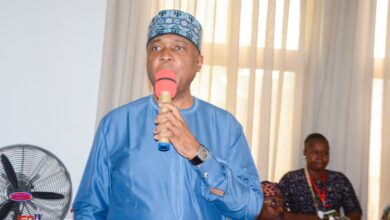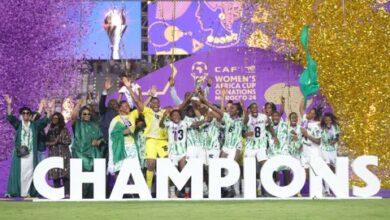Nigerian Government Approves Naira-Based Crude Oil Sales to Dangote Refinery

By Omowumi Omotosho
The Federal Executive Council (FEC) has sanctioned a directive from President Bola Tinubu for the Nigerian National Petroleum Company (NNPC) Limited to conduct crude oil transactions with Dangote Petroleum Refinery and other local refineries in naira.
In an announcement on X, Bayo Onanuga, the president’s special adviser on information and strategy, highlighted that the African Export-Import Bank (Afreximbank) and other Nigerian settlement banks will oversee the dealings between Dangote and NNPC.
The FEC’s approval was granted during a meeting chaired by President Tinubu on Monday. Onanuga stated, “To ensure the stability of the pump price of refined fuel and the dollar-Naira exchange rate, the Federal Executive Council today adopted a proposal by President Tinubu to sell crude to Dangote Refinery and other upcoming refineries in Naira.”
He further explained, “Dangote Refinery at the moment requires 15 cargoes of crude, at a cost of $13.5 billion yearly. NNPC has committed to supply four. But the FEC has approved that the 450,000 barrels meant for domestic consumption be offered in Naira to Nigerian refineries, using the Dangote refinery as the pilot. The exchange rate will be fixed for the duration of this transaction.”
Onanuga mentioned that this move would remove the need for international letters of credit, thereby saving Nigeria significant dollar expenditures.
Commenting on the development, the Executive Chairman of the Federal Inland Revenue Service (FIRS), Zacch Adedeji, noted that byproducts from the Dangote refinery would also be sold in naira. This shift aims to reduce pressure on Nigeria’s foreign exchange reserves.
Adedeji said, “And what does it mean to our economy? One, the pressure on foreign exchange will be reduced.” He detailed that Nigeria currently spends 30 to 40 percent of its foreign exchange on petrol imports, roughly $660 million monthly, equating to $7.92 billion annually.
“With this approval today through FEC led by Mr President, this has reduced by minimum of 90 percent. Because what we have today, the transaction will now be done in our local currency not only to Dangote Refinery but to all local refineries for all our local consumption and this will actually stabilize the pump price,” Adedeji added.
“This will also make economic stability a reality because we will no longer rely on the fluctuation in forex. Once again, this is an innovation of solving our problem as a country today.”
With the new approval, the foreign exchange spent on petrol is expected to drop to a maximum of $50 million per month, totaling $600 million annually. “This is a total reduction of 94 percent and saving us $7.32 billion,” Adedeji noted.
He also highlighted the reduction in finance costs, currently at $79 million, due to the elimination of the need for letters of credit. Afreximbank will serve as the lead arranger for the transactions between NNPC and Dangote Refinery.
Adedeji praised the council members, President Tinubu, NNPC, Dangote refinery, and Afreximbank for their roles in this initiative, which aims to create employment and bolster Nigeria’s economy.
This approval follows a dispute involving Dangote refinery, the Nigerian Midstream and Downstream Petroleum Regulatory Authority (NMDPRA), and the Nigerian Upstream Petroleum Regulatory Commission (NUPRC). Aliko Dangote, founder of Dangote Group, on June 4 reported difficulties in securing crude supplies from international oil companies (IOCs).
NUPRC CEO Gbenga Komolafe, while speaking on Arise TV on July 15, disputed Dangote’s claims, citing the Petroleum Industry Act (PIA), which governs such transactions. Despite this, Dangote Industries Limited (DIL) asserted that IOCs were hindering their crude purchases.
NMDPRA CEO Farouk Ahmed on July 18 criticized local refineries, including Dangote’s, for producing inferior products compared to imports.
In response, on July 20, Dangote tested diesel from his refinery to counter Ahmed’s allegations and called for an investigation. Federal lawmakers initiated probes into the IOCs’ alleged obstruction and Ahmed’s comments.
On July 22, a meeting with Dangote, Ahmed, Komolafe, and NNPC Group CEO Mele Kyari aimed to resolve the conflict. Following this, the House of Representatives requested the suspension of Ahmed for his remarks.




